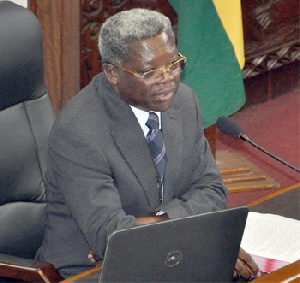An anti-corruption campaigner has questioned the credibility of the French multinational bank, Societe Generale, after the bank was unable to help Ghana with documentation to unravel a $24m controversy because of a French law.
The bank claimed that by French law, it is not required to continue keeping documents after 10 years of existence, suggesting that the document may have been shredded.
The controversy surrounds an NPP MP K.T Hammond who sold an oil drill ship for $24m and used $19.5m to pay a judgement debt owed to Societe Generale. But Ministries of Finance and Energy claim not to have official documents on the transaction.
There is also a controversy over the location of a $3.5m balance arising from the payment after the Bank of Ghana and Ministry of Finance denied receipt of any such money.
Tasked to resolve this and other mysteries is a Judgement Debt Commission who at its public sitting on Tuesday, met officials of Societe Generale in the hope that the bank would help with documents relating to the receipt of $19.5m.
The Sole Commissioner, Justice Yaw Apau, was left frustrated after the Managing Director of Societe Generale (SG) Ghana Limited, Mr Gilbert Hie, insists Societe Generale has no record of $19.5m judgment debt.
Mr Hie explained that by French law, documents are supposed to be kept for a maximum of 10 years, beyond it, the law does not require them to continue keeping them, and was, therefore, not surprised the documents could not be found.
But speaking on Joy FM's Newsnight, Daniel Batidan of the African Parliamentary Network against Corruption, found it curious for a bank to dispose off documents because it was 10-years-old.
He said the bank's recourse to French laws when Ghana is trying to unravel the facts of the case "even adds more questions to the issue of credibility"
Mr. Batidan suggested that the bank's claim is doubtful and that it may be playing to its self-interest as controversy rages on the legitimacy of the sale of an oil drill ship used to defray a $19.5m owed to Societe Generale.
He said countries and companies operate on the basis of their self-interest, and explained that a UN Convention on Corruption faced serious resistance with some Western countries because it was against the self-interest of some multinational companies.
He warned that corruption is now an international crime that involves "a mafia of highly professional people" such as lawyers, accountants, intelligence personnel.
The anti-corruption campaigner said a glimmer of hope that could have helped Ghana to get information on alleged transaction is the United Nations Convention on Corruption of which Ghana and France are both signatories.
But Ghana is yet to domesticate the convention that would have made it part of the country's laws, Daniel Batidan noted.
General News of Wednesday, 18 September 2013
Source: joyonline
Societe Generale's credibility in $19.5m judgement debt saga questioned
Entertainment












